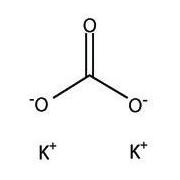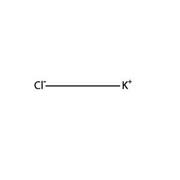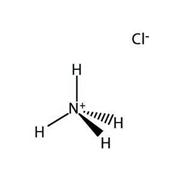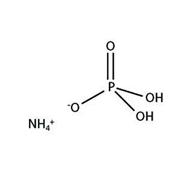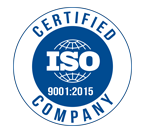bioWORLD, 1 kg, 12350000
-
bioPLUS™ Sodium Metabisulfite
bioWORLDAn antioxidant reducing agent, with antimicrobial and antifungal properties. Application: For Research and Laboratory use only
-
Ammonium sulfate
bioWORLDIt is used largely as an artificial fertilizer for alkaline soils. In the soil the ammonium ion is released and forms a small amount of acid, lowering the pH balance of the soil , while contributing essential nitrogen for plant growth. It is also used as an agricultural spray adjuvant for water…
-
Boric acid (Molecular Biology Grade)
bioWORLDA commonly used molecular biology reagent and also used in electrophoresis buffers. pKa (@ 20°C): 9.24 Molecular Biology Grade (also available in Proteomics Grade) Chloride: <.001% Phosphate: <0.001% Sulfate: <0.01% Calcium: <0.005% Heavy metals…
-
Agarose 1, Biotech Grade
bioWORLDbioPlus Agarose I is formulated specifically for analysis of nucleic acids, using standard electrophoretic techniques. Biotechnology Grade Gel strength: >1200g/cm2 Gelling point: 33-39°C Melting point: 87-89YC Sulfate EEO(-mr) DNase, RNase, Protease activity: None detected …
-
bioPLUS™ Polyvinylpyrrolidone 40000
bioWORLDPolyvinylpyrrolidone 40,000, or better known as PVP, is a solubilizing polymer. It is an effective lubricant and protein stabilizer. PVP has been used to remove alkaloids and phenolics from plant tissue samples to improve mass spectrometry results. Polyvinylpyrrolidone is generally used at 2-4%…
-
Ammonium carbonate
bioWORLDIt is a commercial salt,used when crushed as a smelling salt. It is mainly used as a leavening agent in traditional recipes, particularly those from northern Europe and Scandinavia. It can sometimes be substituted with baking powder. Ammonium carbonate can spontaneously decompose into ammonium…
-
Ferric chloride, hexahydrate
bioWORLDA catalyst in organic synthesis ACS grade Insolubles: <0.01% Nitrate: <0.01% Phosphorus (as PO4: <0.01% Sulfate: <0.01% Copper: <0.003% Ferrous Iron: <0.002% Non-precipitables (NH4OH):<0.1% Zinc: <0.003 Regulated…
-
Magnesium Sulfate, heptahydrate
bioWORLDA preparation of magnesium sulfate Synonym: Epsom salt ACS Grade Chloride: <0.0005% Nitrate: <0.002% Ammonium: <0.002% Calcium: <0.02% Heavy metals (as Pb): <0.0005% Iron: <0.0005% Manganese: <0.0005% Potassium: <0.005% …
-
Ammonium phosphate, dibasic
bioWORLDIt is used as Fertilizer, fire retardant, yeast nutrient in winemaking and brewing mead. DAP is also used as a yeast nutrient in winemaking and brewing mead; It is also used as an additive in some brands of cigarettes purportedly as a nicotine enhancer; to prevent afterglow in matches, in purifying…
-
Potassium Carbonate, anhydrous
bioWORLDSynonyms: Carbonate of potash; Dipotassium carbonate; Dipotassium salt; Pearl ash; Potash; Salt of tartar; Salt of wormwood A potassium salt for deproteinization and as a drying agent Common biochemical reagent used in soap, glass, and china production and as a drying agent and…
-
EDTA, ferric sodium salt
bioWORLDAn eliminator of enzyme catalyzed reaction inhibition. Plant culture tested. Supports or facilitates plant growth and/or shoot proliferation in two or more plant tissue cultures. Appearance: Yellow to Brown Crystalline Powder Boiling Point: 614.2°C Density: 7.87 g/cm3 at…
-
Potassium Chloride
bioWORLDA common laboratory reagent and standard Specifications ACS Grade Iodide: <0.002% Bromide: <0.01% Chlorate and Nitrate: <0.003% Nitrogen compounds: <0.001% Phosphate: <0.0005% Sulfate: <0.001% Barium: <0.001% …
-
Sodium Alginate
bioWORLDSodium Alginate, or Alginic Acid Sodium Salt, is a natural amylose carbohydrate distilled from algae. It is used in biotechnology as an effective stabilizer and emulsifier. In the presence of Calcium ions, Sodium Alginate has been observed to form cross-linked gels for cell immobilization. Plant…
-
Activated charcoal acid washed
bioWORLDHigh-purity carbon, especially useful for minimizing contamination in products. Supports or facilitates plant growth and/or shoot proliferation in two or more plant tissue cultures. This charcoal is plant tissue tested. Appearance: Grey solid Density : 1.8-2.1g/cm3 Oxidation_State: 4,3,2,1,0,-1,-2,-3,-4
-
Ammonium chloride
bioWORLDA compound used in the lysis of red blood cells and protein isolation techniques. It is a reagent used in a variety of industrial and research applications. Useful in protein isolation techniques. Also used in the study of basic calcium phosphate crystals in fibroblasts. Inhibits intracellular…
-
Sodium Acetate Anhydrous is used for precipitation of nucleic acids and preparation of gel stains for protein gel electrophoresis. Sodium Acetate Anhydrous can serve as a reagent with many uses including nucleic acid precipitation in isolation protocols and for use in buffers. Application: For…
-
Agar, Phytoagar
bioWORLDFree of extra salts that are often present in many agar preparations and affect plant growth. Gel Strength: 950 g/cm 2 Working Concentration: 5−7 g/L Gelling Temperature: 38°C Moisture: 10.92% Ash Content: 1.2% Swelling Index: 9.0 mL Water Absorption:…
-
Potassium hydroxide
bioWORLDBuffer reagent Used for making potassium soap, shampoo, potassium permanganate etc. Used in dye, drugs manufacture, galvanization, carving, lithography etc. A basic reagent used for alkaline lysis and pH purposes. Specifications Reagent Grade Moisture: 10-15% …
-
An oxidation resistant analytical standard ACS grade Insolubles: <0.01% Chloride: <0.001% Nitrate: <0.001% Copper: <0.003% Ferrous Iron: <0.001% Non-precipitates: <0.05% Zinc: <0.003% Appearance: Solid Boiling Point: 230°C…
-
EDTA, disodium salt, dihydrate
bioWORLDA metal chelating agent commonly used in tissue culture media and biological buffers. Inactivates nucleases. Also known as Ethylenediaminetetraacetate, disodium salt, dihydrate Biotechnology Grade (also available in Pretoemics Grade) Insolubles: <0.005% Heavy metals (as Pb):…
-
Glycine
bioWORLDA reagent used in buffers. A compound used for polyacrylamide gel electrophoresis and Western blots. Biotechnology Grade A280 (1.0M, water): <0.1 Moisture: <0.2% Chromatography: Single spot Heavy metals (as Pb): <0.002% Appearance: White solid …
-
Ferrous sulfate, heptahydrate
bioWORLDA reducing agent with many other applications Used as a mordant in dyeing wool, in the manufacture of ink, in water purification as a substitute for aluminum sulfate, as a fertilizer, and as a feed additive. Used to produce magnetic ferric oxide. ACS Grade Insolubles: <0.01% …
-
bioPLUS™ Sucrose, Ultra Pure Grade
bioWORLDSucrose is a disaccharide related to Glucose and Fructose. It is most commonly used in biotechnology as a carbohydrate source in plant tissue culture media. Sucrose has been observed to significantly improve root and shoot growth. Ultra Pure Grade Sucrose is DNase and RNase free. It is a popular…
-
bioPLUS™ Urea
bioWORLDUrea is an organic compound with two amine groups joined by a carbonyl functional group. It serves an important role in the metabolism of nitrogen-containing compounds and makes an excellent Nitrogen-source in plant fertilizer. Urea is often used in protein denaturation and tissue fixation. Unlike…
-
A polymer used to precipitate proteins, viruses, DNA and RNA. Compound is hydroscopic.s Appearance: Solid Density: 1.21 g/cm3 at 20°C pH Value: 5-7 RTECS Number: TQ4025000
-
EDTA, tetrasodium salt, dihydrate
bioWORLDA metal chelating agent commonly used in tissue culture media and biological buffers. Also known as Ethylenediaminetetraacetate, tetrasodium salt, dihydrate Ultra Pure Grade Heavy metals (as Pb): <0.001% Iron: <0.005% Nitrilotriacetic acid: <0.1% Appearance:…
-
Gelatin for Bacteriological Media
bioWORLDA high grade granular preparation of gelatin that can be used alone as a solidification agent or incorporated into microbiological media as a nutrient or to determine gelatin liquefaction. Ash: 0.17% Moisture: 8.7% Coliforms: less than 3/gm Std. Plate: 10/gm/p> E. coli…
-
Ammonium phosphate, monobasic
bioWORLDIt is formed when a solution of phosphoric acid is added to ammonia until the solution is distinctly acidic. It is often used in the blending of dry agricultural fertilizers. It supplies soil with the elements nitrogen and phosphorus in a form which is usable by plants. The compound is also a…
-
bioPLUS™ Sodium Chloride
bioWORLDSodium Chloride is arguably the most essential salt in molecular biology and cell culture. It is a common ingredient in cell culture media, lysis buffers, and protein storage. Molecular Biology Grade Sodium Chloride is of >99% purity and has been thoroughly tested for chemical impurities. It is…
-
The bioWORLD bioPLUS™ anhydrous potassium phosphate dibasic is suitable for use in molecular biology experiments and plant tissue culture technique. Application: For Research & Laboratory Use Only
-
Ammonium Acetate
bioWORLDBeing the salt of a weak acid and a weak base, ammonium acetate has a number of distinctive properties. It is occasionally employed as a biodegradable de-icing agent. It is often used with acetic acid to create a buffer solution, one that can be thermally decomposed to non-ionic products. It is…
-
L-Arginine
bioWORLDSynonym: ( S )-2-Amino-5-guanidinopentanoic acid A precursor of nitric oxide synthesis that induces vasodilation Appearance: White crystalline powder Boiling Point : ~367.6°C at 760 mmHg (Predicted) Density : 1.46 g/cm3 HS Code : 29252000 IUPAC_Name:…











